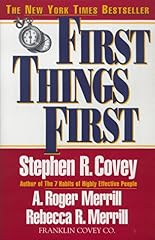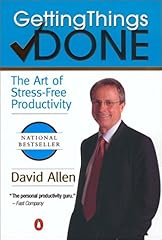Here are a few books on time management that I have found to be particularly valuable:
First Things First [1]
I first wrote about First Things First [1], by Stephen Covey, in the April 1998 issue of USENIX’s ;login: magazine [2]. I consider it to be the best conceptual exploration of the subject. Three of its most powerful messages are to:
- Distinguish between the important-but-not-urgent and the urgent-but-not-important
- Exercise integrity in the moment of choice
- Reframe the idea of Time Management into one of Life Leadership
Indeed, when you reframe time management as life leadership, you’re motivated to exercise integrity in the moment of choice, and you become able to distinguish between the important-but-not-urgent and the urgent-but-not-important. This lets you spend more time on the things that are truly the most important to you.
Here’s a great video from a Stephen Covey workshop that visually demonstrates the value of putting First Things First:
Getting Things Done (GTD) [3]
With GTD, David Allen provides a rich, practical toolset to help you — what else — get things done. Here are some of his key points:
- Get your “open loops” (essentially, those incomplete things that you have agreed to do or are planning to do) out of your head and into your system, so that you don’t have to expend inefficient mental energy on that stuff. Free your mind to do what it does best.
- When you’re feeling stuck on a project, focus on the next action that needs to be done. This is an actual, concrete, physical task that you can do that will get you closer to your goal. Identifying the next action, even if it’s seemingly minor, can often help break up logjams.
- Develop in-context lists for where and when you are, to make optimal use of your time. For example, if you accumulate a list of calls to make and have it with you when you get into your car, you can go through a bunch of them when you’re waiting in traffic. As another example, if you just found out about a product that’s currently in beta, and probably not ready for another couple of months, have your calendar alert you 60 days from now so that your future self can follow up.
Here is a interview by Fast Company with David Allen on GTD:
Generally speaking, First Things First [1] takes a top-down approach, and Getting Things Done [3] takes a bottom-up approach. I find them to be highly valuable, complementary in nature, and I’ve successfully applied strategies and tactics from both. I skip the aspects of both systems that I find to be burdensome, and keep what I like. The result is a continually evolving, personalized approach that works best for me.
Type and Time Management [4]
Speaking of personalized approaches, I think that Type and Time Management [4] by Sharon Fitzsimmons is an excellent resource for people looking for time management tips that fit their personality. It’s also great for anyone who is coaching others. The book includes detailed interviews with several people from each of the 16 different Myers-Briggs types [5] (I’m interviewed in the ENTP chapter); discussions of the general interactions with each personality type; a well-organized summary page for each type with specific suggestions; and a final insightful chapter on Comparisons, Contrasts, Questions and Conclusions.


